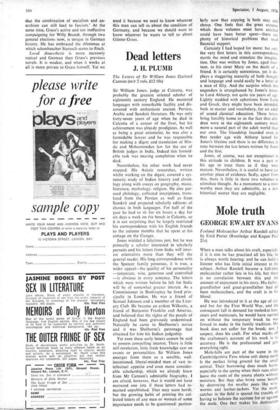Dead letters
J. H. PLUMB
The Letters of Sir William Jones Garland Cannon (our, 2 vols, £1210s)
Sir William Jones, judge at Calcutta, was probably the greatest oriental scholar of eighteenth century England. He mastered languages with remarkable facility and dis- covered with enthusiasm ancient Persian, Arabic and Sanskrit literature. He was only forty-seven years of age when he died in Calcutta of a cancer of the liver, but his achievement was already prodigious. As well as being a great orientalist, he was also a formidable lawyer and he was responsible for making a digest and translation of Hin- du and Mohammedan law for the use of British judges in India. Indeed this formid- able task was nearing completion when he died.
Nevertheless, his other work had never stopped. His Asiatic researches, written whilst working on the digest, covered a sys- tematic study of Indian history and chron- logy along with essays on geography, music, literature, mythology, religion. He also pur- sued philology, collected inscriptions, trans- lated from the Persian as well as from Sanskrit and prepared scholarly editions of, classics in both languages. For half of the year he had to sit for six hours a day for six days a week on the bench in Calcutta, so it is not surprising that he largely restricted his correspondence with his English friends to the autumn months that he spent at his cottage on the Ganges.
Jones wielded a felicitous pen, but he was primarily a scholar interested in scholarly pursuits and his letters from India will inter- est orientalists more than they will the general reader. His long correspondence with the Spencer family possesses, it is true, a wider appeal—the quality of his personality —temperate, wise, generous and controlled —is obvious in every sentence. The letters which were written before he left for India will be of somewhat greater interest. As a Commissioner in Bankruptcy he lived prin- cipally in London. He was a friend of Samuel Johnson and a member of the Liter- ary Club. He became an ardent Wilkesite, a friend of Benjamin Franklin and America, and believed that the rights of the people of England had been grievously undermined. Naturally he came to Shelburne's notice and it was Shelburne's patronage that obtained for him his Indian judgeship.
Yet even these early letters cannot be said to possess compelling interest. There is little self-revelation, little fresh knowledge cast on events or personalities. Sir William Jones emerges from them as a sensible, well- intentioned, liberal-minded man of vast in- tellectual appetite aqd even more consider- able scholarship, which we already knew from Mr Cannon's admirable biography. I am afraid, however, that it would not have mattered one iota if these letters had re- mained unpublished. That may seem harsh, but the growing habit of printing the col- lected letters of any man or woman of some importance needs to be questioned: particu- larly now that copying is both easy and cheap. One feels that the great expense which these volumes must have entailed could have been better spent—there are plenty of historical problems that need financial support.
Certainly I had hoped for more: but only the very first letters in this correspondence startle the mind and stimulate the imagina- tion. One was written by Jones, aged four- teen, to his sister Mary on the death of a friend. It is certainly sententious, yet it dis- plays a staggering maturity of both thought and language and could easily be a letter of a man of fifty. And the surprise which this engenders is strengthened by Jones's letters to Lord Althorp, not quite ten years of age. Lightly studded with aphorisms from Latin and Greek, they might have been intended. both in matter and vocabulary, for an adult of sound classical education. These letters bring forcibly home to us the fact that chil- dren were in the eighteenth century much more a natural part of the adult world than our own. The friendship founded even at that tender age with Althorp lasted for Jones's lifetime and there is no difference in tone between the last letters written by Jones and the first.
Jones, of course, was not exceptional in this attitude to children. It was a part of his age to treat them as if they were mature. Nevertheless, it is useful to have yet another piece of evidence. Sadly, apart from this, there is little in these two volumes to stimulate thought. As a monument to a most worthy man they are admirable, as a nest' historical source they are negligible.






























 Previous page
Previous page